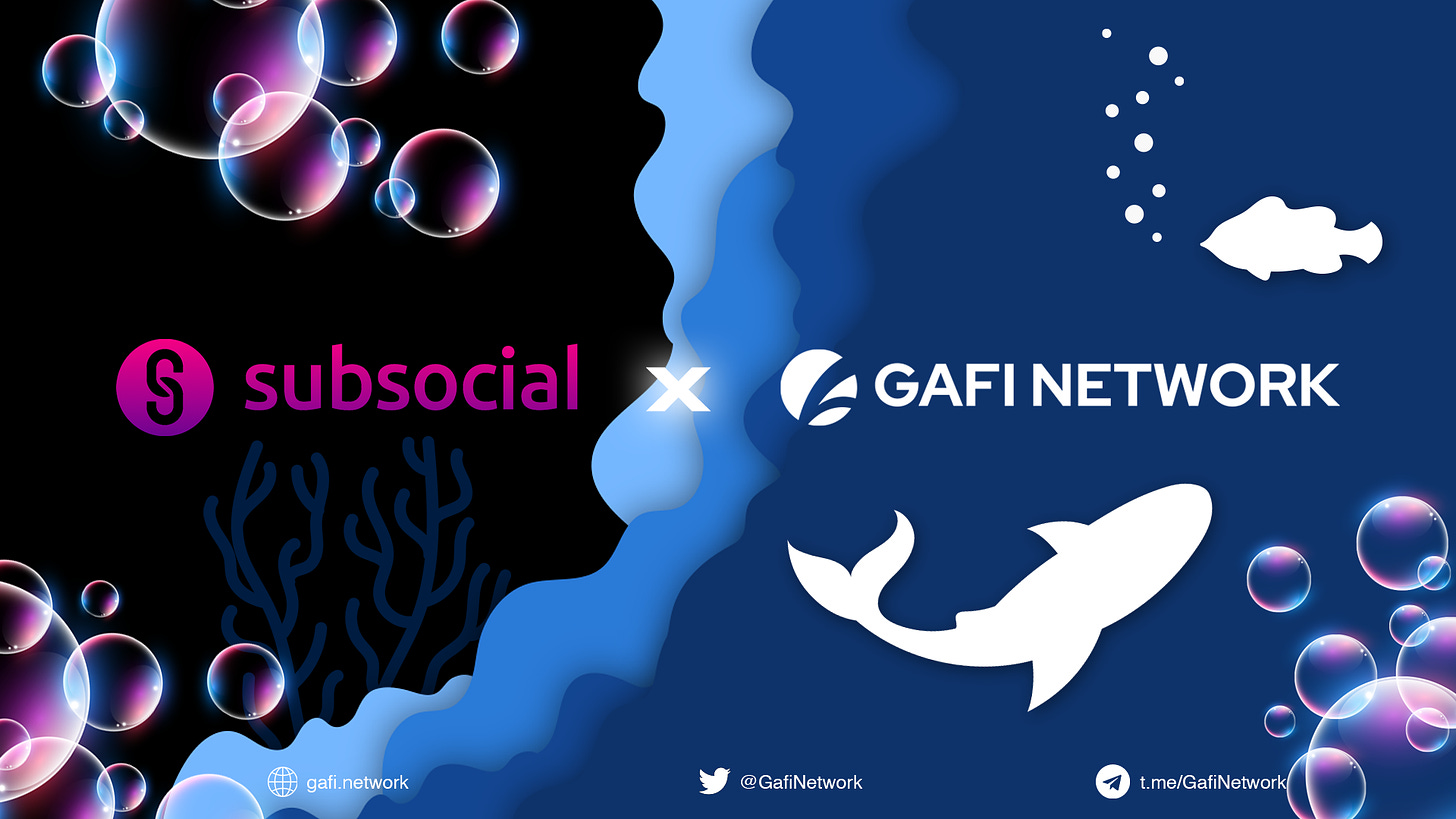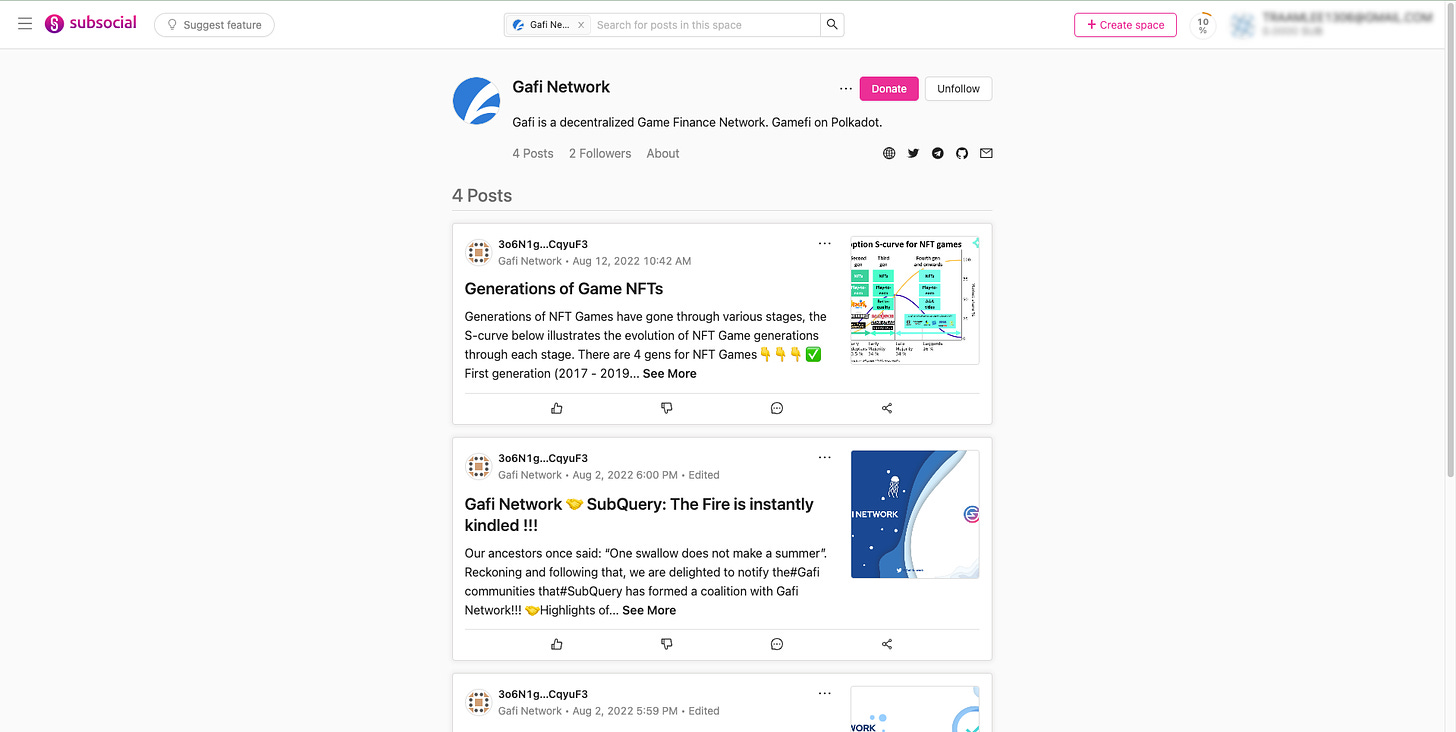Subsocial - The Decentralized Social Finance In The View of Gafi Network
We are pleased to inform the Gafi community that Subsocial has teamed up with Gafi Network!
The Decentralized Social Finance In The View of Gafi Network
Web3 Overview?
Overview
Web3 is the moniker given by some technologists to the concept of a new type of internet service developed utilizing decentralized blockchains — the shared ledger systems used by cryptocurrencies such as Bitcoin and Ether.
The word has existed for a while, but it has only recently gained popularity. Packy McCormick, a web3 promoter, has defined it as "the internet owned by the builders and users, orchestrated with tokens."
Benefits
Web3 is a new and quickly evolving technology that will permanently alter how we interact with the Internet. It will be some time before Web3's full potential is realized, but we can already see some of its distinct advantages:
-
**Ownership of data:**When you use a platform like Facebook or YouTube, these companies gather, own, and monetize your data. However, in web3, your data is kept on the so-called crypto wallet. You'll utilize your wallet to interact with applications and communities on web3, and you'll take your data with you when you log out. In theory, because you control this data, you can determine whether or not to monetize it.
-
Pseudonymity: It is a decentralized identity system, so you have complete control over your online identity and personal information. You also have a cryptographically safe means to verify the accuracy of the information. Your wallet is your identification on web3, and it is not easily connected to your real identity. So, while someone may be able to observe the activities of someone's wallet, they will not be able to tell that it is your wallet."My personal information is hidden, but my activities are public," Neuroth succinctly says.
-
Democracy: Apps on web3 will be managed by decentralized autonomous organizations (DAOs). This implies that rather than a central administration making all choices, decisions are made by users who have governance tokens, which can be gained by engaging in the upkeep of these decentralized apps or purchasing them.
Web3 will not, in all likelihood, replace web 2.0 in the near future. "I don't believe that web3 must completely replace web 2.0. Most of the time, it will run concurrently to web 2.0 "According to Neuroth. "It just means that customers will have more alternatives. If you want to utilize Facebook, go ahead and do so. If you want to use a decentralized system that rewards you for participation, you can go do that."
What is Social Media?
Definition
The notion that social media are characterized solely by their ability to bring people together has been deemed excessively broad, implying that fundamentally different technologies such as the telegraph and telephone are also social media. The nomenclature is unclear, with some early studies in the mid-2000s referring to social media as social networks or social networking services. A more recent article from 2015 evaluated the relevant literature and identified four common qualities that distinguished then-current social media services:
-
Social media are Web 2.0 Internet-based applications.
-
User-generated content (UGC) is the lifeblood of the social media organism.
-
Users build service-specific profiles for the site or app, which the social media organization designs and maintains.
-
By integrating a user's profile with that of other individuals or groups, social media facilitates the creation of online social networks.
While it is difficult to define social media due to the range of evolving stand-alone and built-in social media services, marketing and social media professionals generally agree that social media encompasses the following 13 types:
-
Blogs (ex. Huffington Post, Boing Boing)
-
Business networks (ex. LinkedIn, XING)
-
Collaborative projects (ex. Wikipedia, Mozilla)
-
Enterprise social networks (ex. Yammer, Socialcast)
-
Forums (ex. Gaia Online, IGN Boards)
-
Microblogs (ex. Twitter, Tumblr)
-
Photo sharing (ex. Flickr, Photobucket)
-
Products/services review (ex. Amazon, Elance)
-
Social bookmarking (ex. Delicious, Pinterest)
-
Social gaming (ex. Mafia Wars)
-
Social network sites[6] (ex. Facebook, Google+)
-
Video sharing (ex. YouTube, Vimeo)
-
Virtual worlds (ex. Second Life, Twinity)
Why is it important?
It is obvious that the benefits provided by Social Media were enormous, and listing them all would need an essay three times larger than this one.
Social media is used by billions of people across the world to exchange information and build relationships. On a more personal level, social media allows you to contact friends and family, learn new things, pursue interests, and be entertained. Professionally, you may use social media to expand your expertise in a certain sector and to create your professional network by engaging with other experts in your industry. At the corporate level, social media allows you to engage your audience, get customer feedback, and raise your brand.
Current barriers to Social Media
Of course, the importance of Social Media is undeniable, but these advantages are not shared equally by all. It benefits some while exhausting a large number of issues.
Privacy
Privacy rights advocates caution social media users about the gathering of their personal data. Through electronic tracking and third-party applications, certain information is collected without the user's awareness or consent. Data mining techniques used by social media intelligence may also be used to acquire data for law enforcement and governmental purposes. Data and information may also be gathered for the benefit of third parties. When information is posted on social media, it no longer remains private.o
There are arguments that "privacy is gone," and that as social media gets bigger, some heavy social media users appear to be indifferent about their privacy. Others claim that individuals are still worried about their privacy, but that these concerns are being neglected by the firms that manage these social networks, which can sometimes benefit from revealing someone's personal information.
When someone opens a new social media account, they supply personal information such as their name, birthday, geographic location, and personal interests. In addition, companies also gather data on user activity. Companies keep and utilize this data to better target advertisements to their consumers.
Commercialization
Social media's commercial development has been criticized as consumers' behaviors in these environments have become increasingly value-creating, for example, when they contribute to the marketing and branding of certain items by submitting positive evaluations. As a result, value-creating activities raise the real value of a certain product.
As social media usage has grown in popularity, it has been increasingly commercialized by marketing firms and advertising organizations.
Deplatforming
Deplatforming is a type of Internet censorship in which controversial speakers or content are suspended, banned, or otherwise removed from social media platforms.
In an August 2018 Wall Street Journal article, law professor Glenn Reynolds declared 2018 the "Year of Deplatforming." According to Reynolds, "the internet titans opted to close the doors on a lot of people and ideas they don't like" in 2018. You are now at risk if you rely on someone else's platform to promote controversial beliefs." Reynolds identified Alex Jones, Gavin McInnes, and Dennis Prager as notable 2018 victims of political deplatforming, stating that "Extremists and controversialists on the left have been relatively safe from deplatforming." Most individuals believe that social media sites restrict offensive political ideas.
Transparency
Few governments publicly confess to or completely reveal their filtering and banning operations when it comes to internet information. When it comes to preventing access to political information, states are typically opaque and/or misleading. As an example:
Saudi Arabia and the United Arab Emirates (UAE) are among the few countries that provide full information about their filtering techniques and notify users when they attempt to visit a restricted website. The websites that have been prohibited are usually obscene or un-Islamic in nature.
Users in Uzbekistan are routinely sent to block sites indicating that the website has been restricted due to pornography, even though the page contains no pornography. Users' requests for forbidden websites in Uzbekistan may also be redirected to irrelevant websites or sites identical to the banned websites but with different information.
Gafi Network Partners with Subsocial
Gafi Network is excited to announce a partnership with Subsocial - an open platform that facilitates interaction on the censorship-resistant Web3 social platform of Polkadot's Ecosystem.
Gafi Network - We're on Subsocial!These days, users find it difficult to promote blockchain projects due to the stringent restrictions of centralized social networks. As a result, the phenomenon that users will shift from centralized to decentralized social networks will be likely to happen, where people freely express and deliver information.
Highlights of Partnership
-
Cross-marketing: Gafi is a gaming platform with mechanisms that attract players, developers, and game projects to join Gafi. All guidelines, tutorials, and governance announcements,... will be posted on Subsocial alongside #Twitter and #Medium.
-
Gafi to build bridges to Subsocial through XCM, allowing more Gamers to trade NFT or Token directly on Subsocial's platform as a secondary MarketPlace.
-
Both Gafi and Subsocial are part of Polkadot's Ecosystem and will work together to develop Polkadot's Ecosystem.
While you're at it, make sure to follow Gafi on Subsocial!
👉https://app.subsocial.network/7248
About Gafi Network
-
Gafi is a decentralized blockchain platform designed for high-frequency apps and blockchain gaming. The Gafi Network is likewise a layer one blockchain made on Substrate.
-
The Gafi Network supports EVM (Ethereum Virtual Machine), which allows projects to migrate from Ethereum or Binance Smart Chain to the Gafi Network with little or no adjustments.
-
Gafi Network features capabilities and user-friendly interfaces that make it trouble-free for end-users and builders to use and build with Gafi.
📌 Find us:Website | Telegram | Twitter | Wiki | Blog | Subsocial
About Subsocial
-
Subsocial is an open platform that allows anyone to launch their own decentralized censorship-resistant social networks and marketplaces. Subsocial will help you create your own decentralized version of the popular sites we see today, such as Medium, Twitter, Reddit, Instagram, Discourse, Patreon, OnlyFans, and more.
-
Using Substrate also allows Subsocial to connect to the Polkadot and Kusama networks. Polkadot and Kusama are next-generation blockchain protocols that unite an entire network of purpose-built blockchains, allowing them to interoperate seamlessly at scale. Polkadot and Kusama will provide cross-chain interactions as well as providing a shared security platform upon which Subsocial can scale. Subsocial is social media unbounded.
📌 Find us:Website | Telegram | Twitter | Docs | Blog
👉 Follow us for more information.
👉 Please feel free to give your feedback and comments.
Thanks and Best regards!
The foundation builds with top-class technologies, architecture, and mechanisms for the next wave of Blockchain-based Gaming.




0 comments